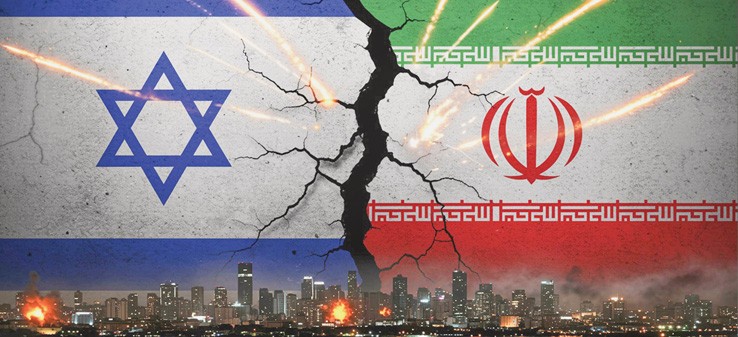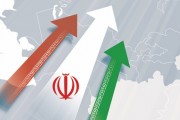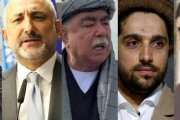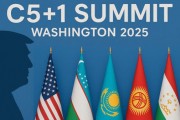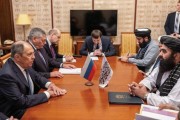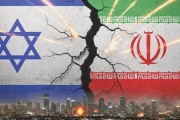Publish Date
Wednesday 3 September 2025 - 10:30
recommended
0
IESS’ Exclusive interview with Alexander Knyazev
Central Asia's responses to the US-Israel Aggression against Iran
The multilateral foreign policy adopted by Central Asia countries is based on the principle of neutrality in international disputes. Within this framework, they believe that no side should be taken in global conflicts—especially when one of the parties involved is the United States, which still enjoys the status of a global superpower. Taking provocative positions against such a power could bring negative reactions and undesirable consequences for these states. This diplomatic behavior reflects the inability of these countries to fully utilize their sovereign capacities as well as their lack of independent decision-making in foreign policy.
IESS’ Exclusive interview with Alexander Knyazev
6 minutes Reading
6 minutes Reading
The aggression of the Zionist regime and the U.S. against Iran and the ensuing 12-day war unfolded with unprecedented speed and unpredictability, and is expected to carry profound and wide-ranging consequences for Iran’s surrounding regions. Naturally, Iran’s foreign policy as well as its security and defense strategies will undergo significant shifts after this war—changes that will also be visible in Central Asia. One of the most crucial issues for Iran after this war is the reactions and responses of different countries including those in Central Asia at the governmental, elite, and public levels to this aggression.
Given the importance of this issue, and to explore in greater depth the responses in Central Asia to the Iran–Israel/U.S. conflict, as well as the implications of this war for Iran–Central Asia relations, the Central Asia Working Group of the Institute for East Strategic Studies (IESS) conducted an exclusive interview with Dr. Alexander Knyazev, Senior Researcher at the Center for Eurasian Studies, Institute of International Relations at MGIMO University in Moscow.
• IESS: Among the Central Asian countries, four states did not explicitly condemn the aggression of the Zionist regime and the U.S. against Iran in their statements, instead trying to remain neutral. In your view, why and how did they adopt such a stance?
Knyazev: The multilateral foreign policy adopted by these countries is rooted in the principle of neutrality in international disputes. Within this approach, they believe that they should not side with any party in international conflicts—particularly when one of the parties is the United States, which continues to hold the position of a global superpower.
Taking provocative stances toward such a power can bring negative reactions and undesirable consequences for these states. This type of diplomatic behavior reflects their inability to fully utilize sovereign capacities and their lack of independent decision-making in foreign policy—a weakness stemming not from internal structures but from external pressures and international considerations.
Economically, and especially in political-military terms, the countries of the region have limited capabilities, and their standing in the international system is not particularly prominent. Thus, openly supporting one side in the conflict is considered risky: if that side were to lose, the repercussions could be extremely severe for them.
• IESS: Among the Central Asian countries, Tajikistan was the only one that explicitly condemned the aggression of the Zionist regime and the United States against Iran. Why did Tajikistan take such a different stance? Why did it not follow the caution shown by the other Central Asian states?
Knyazev: Tajikistan, due to its cultural and linguistic ties, sees Iran as a close and kindred country. Although there remain certain challenges and disagreements in bilateral relations, expressing solidarity with the Islamic Republic of Iran is viewed as a reaffirmation of Tajikistan’s identity as part of the Persian-speaking world and the Iranian civilizational sphere.
Of course, like other Central Asian states, Tajikistan also pursues a multilateral foreign policy, but China and Russia are the two main and influential players in the country's international relations, and its external dependencies are mostly directed toward these two powers. Thus, the decisions of Dushanbe in such situations are usually aligned with the approaches of Beijing and Moscow. If any threat were to arise from Tajikistan’s stance in the Iran–Israel conflict, it is expected that the country would rely on the support of China and Russia to face such a challenge. Moreover, overall U.S. influence in Tajikistan is lower compared to other Central Asian countries such as Kazakhstan, Kyrgyzstan, and Uzbekistan.
• IESS: What were the reactions of elites and people of Central Asia to the Zionist regime’s aggression against Iran? How do you think people in the region perceive this, and what do they expect from their governments?
Knyazev: The reactions varied significantly across the region. In Tajikistan, the majority of people expressed a negative outlook toward the aggressions of Israel and the United States, with these views largely aligning with the positions of the country’s elites. In contrast, in Turkmenistan, due to the lack of transparency in public information, accurately assessing public reactions is difficult; nonetheless, signs of opposition to Israel’s actions can be seen on social media—just as there were criticisms in response to Israel’s actions in Gaza, which in some ways recall genocidal policies.
In Kazakhstan, Kyrgyzstan, and to some extent Uzbekistan, one can say there exists a gap between official government stances and public sentiment. Political and social space in Kazakhstan and Kyrgyzstan is very fragmented and diverse; Western-oriented NGOs play an influential role, and such tendencies are also visible among many political elites. For this reason, judging public sentiment in these countries is not straightforward, as it is marked by notable contradictions and diversity.
• IESS: How do the governments and elites of Central Asia assess the prospect of confrontation between Iran and the Zionist regime? How important is this issue for the analytical and research institutions in these countries?
Knyazev: It seems the level of attention paid by the region’s research and analytical institutions to the confrontation between the Islamic Republic of Iran and Israel can be considered moderate. Public awareness of the ongoing tensions between Iran, Israel, and the United States has led most countries in the region to stress neutrality, often citing bodies such as the United Nations and principles of international law in their positions.
However, the prevailing understanding among analysts is that, in current international relations, the only principle that truly matters is the “right of power.” Under such conditions, the Central Asian states have adopted a cautious, observer-oriented strategy—similar to the approach they took regarding the confrontation of Russia and West over the Ukraine crisis.
Undoubtedly, a continuation of Iran’s confrontation with Israel and the U.S. does not align with the interests of the Central Asian states—particularly those sharing borders with Iran. From an economic perspective, Iran’s trade volume with these countries is not extensive; among the vulnerable areas, transportation and logistics stand out. Any escalation could threaten to block land routes leading to Western countries and access roads to the Persian Gulf ports.
• IESS: In your view, how could a war between Iran and the Zionist regime affect the future of Iran’s relations with Central Asian countries? Beyond transit and logistics issues, what other concerns exist in the region?
Knyazev: The first and most significant concern in the event of a broader war would likely be the influx of refugees. This challenge, alongside the potential impacts on Central Asian countries’ transit and logistics, was already discussed in the region during the recent aggression against the Islamic Republic of Iran.
• IESS: Considering the mentioned war and the possibility of its recurrence, in which areas should Iran focus its attention in its relations with Central Asia?
Knyazev: The most important matter is likely for Iran to secure guarantees from Central Asian countries—particularly Turkmenistan, Kazakhstan, and perhaps Uzbekistan—that their territories will in no way be used for actions or operations against Iran. (IESS: There is a claim that in the previous war, Israel used Azerbaijani territory to attack Iran.)
• IESS: How could this war affect the future of Central Asian countries’ relations with the Zionist regime? Are these countries ready to adopt more cautious policies in their interactions with Israel?
Knyazev: Unlike Azerbaijan, Central Asian countries’ relations with Israel are neither extensive nor dynamic. There is no prospect for significant expansion either, as Israel does not hold a vital position in these countries’ international interactions. Kyrgyzstan and Tajikistan’s relations with Israel are extremely limited. Turkmenistan’s relations with Israel were somewhat active during the presidency of Saparmurat Niyazov, the country’s first president, but have now diminished to a minimum.
Israel’s level of cooperation with Kazakhstan and Uzbekistan is somewhat higher, yet it is unlikely that Israel ranks even among the top 30 foreign partners of these countries. It seems that all five regional states strive to maintain their neutrality as much as possible; and if they ever adjust their positions, it will only be in response to global circumstances and developments.
Alexander Knyazev is a Senior Researcher at the Center for Eurasian Studies within Institute of International Relations at MGIMO University in Moscow, under the Russian Ministry of Foreign Affairs.
Given the importance of this issue, and to explore in greater depth the responses in Central Asia to the Iran–Israel/U.S. conflict, as well as the implications of this war for Iran–Central Asia relations, the Central Asia Working Group of the Institute for East Strategic Studies (IESS) conducted an exclusive interview with Dr. Alexander Knyazev, Senior Researcher at the Center for Eurasian Studies, Institute of International Relations at MGIMO University in Moscow.
• IESS: Among the Central Asian countries, four states did not explicitly condemn the aggression of the Zionist regime and the U.S. against Iran in their statements, instead trying to remain neutral. In your view, why and how did they adopt such a stance?
Knyazev: The multilateral foreign policy adopted by these countries is rooted in the principle of neutrality in international disputes. Within this approach, they believe that they should not side with any party in international conflicts—particularly when one of the parties is the United States, which continues to hold the position of a global superpower.
Taking provocative stances toward such a power can bring negative reactions and undesirable consequences for these states. This type of diplomatic behavior reflects their inability to fully utilize sovereign capacities and their lack of independent decision-making in foreign policy—a weakness stemming not from internal structures but from external pressures and international considerations.
Economically, and especially in political-military terms, the countries of the region have limited capabilities, and their standing in the international system is not particularly prominent. Thus, openly supporting one side in the conflict is considered risky: if that side were to lose, the repercussions could be extremely severe for them.
• IESS: Among the Central Asian countries, Tajikistan was the only one that explicitly condemned the aggression of the Zionist regime and the United States against Iran. Why did Tajikistan take such a different stance? Why did it not follow the caution shown by the other Central Asian states?
Knyazev: Tajikistan, due to its cultural and linguistic ties, sees Iran as a close and kindred country. Although there remain certain challenges and disagreements in bilateral relations, expressing solidarity with the Islamic Republic of Iran is viewed as a reaffirmation of Tajikistan’s identity as part of the Persian-speaking world and the Iranian civilizational sphere.
Of course, like other Central Asian states, Tajikistan also pursues a multilateral foreign policy, but China and Russia are the two main and influential players in the country's international relations, and its external dependencies are mostly directed toward these two powers. Thus, the decisions of Dushanbe in such situations are usually aligned with the approaches of Beijing and Moscow. If any threat were to arise from Tajikistan’s stance in the Iran–Israel conflict, it is expected that the country would rely on the support of China and Russia to face such a challenge. Moreover, overall U.S. influence in Tajikistan is lower compared to other Central Asian countries such as Kazakhstan, Kyrgyzstan, and Uzbekistan.
• IESS: What were the reactions of elites and people of Central Asia to the Zionist regime’s aggression against Iran? How do you think people in the region perceive this, and what do they expect from their governments?
Knyazev: The reactions varied significantly across the region. In Tajikistan, the majority of people expressed a negative outlook toward the aggressions of Israel and the United States, with these views largely aligning with the positions of the country’s elites. In contrast, in Turkmenistan, due to the lack of transparency in public information, accurately assessing public reactions is difficult; nonetheless, signs of opposition to Israel’s actions can be seen on social media—just as there were criticisms in response to Israel’s actions in Gaza, which in some ways recall genocidal policies.
In Kazakhstan, Kyrgyzstan, and to some extent Uzbekistan, one can say there exists a gap between official government stances and public sentiment. Political and social space in Kazakhstan and Kyrgyzstan is very fragmented and diverse; Western-oriented NGOs play an influential role, and such tendencies are also visible among many political elites. For this reason, judging public sentiment in these countries is not straightforward, as it is marked by notable contradictions and diversity.
• IESS: How do the governments and elites of Central Asia assess the prospect of confrontation between Iran and the Zionist regime? How important is this issue for the analytical and research institutions in these countries?
Knyazev: It seems the level of attention paid by the region’s research and analytical institutions to the confrontation between the Islamic Republic of Iran and Israel can be considered moderate. Public awareness of the ongoing tensions between Iran, Israel, and the United States has led most countries in the region to stress neutrality, often citing bodies such as the United Nations and principles of international law in their positions.
However, the prevailing understanding among analysts is that, in current international relations, the only principle that truly matters is the “right of power.” Under such conditions, the Central Asian states have adopted a cautious, observer-oriented strategy—similar to the approach they took regarding the confrontation of Russia and West over the Ukraine crisis.
Undoubtedly, a continuation of Iran’s confrontation with Israel and the U.S. does not align with the interests of the Central Asian states—particularly those sharing borders with Iran. From an economic perspective, Iran’s trade volume with these countries is not extensive; among the vulnerable areas, transportation and logistics stand out. Any escalation could threaten to block land routes leading to Western countries and access roads to the Persian Gulf ports.
• IESS: In your view, how could a war between Iran and the Zionist regime affect the future of Iran’s relations with Central Asian countries? Beyond transit and logistics issues, what other concerns exist in the region?
Knyazev: The first and most significant concern in the event of a broader war would likely be the influx of refugees. This challenge, alongside the potential impacts on Central Asian countries’ transit and logistics, was already discussed in the region during the recent aggression against the Islamic Republic of Iran.
• IESS: Considering the mentioned war and the possibility of its recurrence, in which areas should Iran focus its attention in its relations with Central Asia?
Knyazev: The most important matter is likely for Iran to secure guarantees from Central Asian countries—particularly Turkmenistan, Kazakhstan, and perhaps Uzbekistan—that their territories will in no way be used for actions or operations against Iran. (IESS: There is a claim that in the previous war, Israel used Azerbaijani territory to attack Iran.)
• IESS: How could this war affect the future of Central Asian countries’ relations with the Zionist regime? Are these countries ready to adopt more cautious policies in their interactions with Israel?
Knyazev: Unlike Azerbaijan, Central Asian countries’ relations with Israel are neither extensive nor dynamic. There is no prospect for significant expansion either, as Israel does not hold a vital position in these countries’ international interactions. Kyrgyzstan and Tajikistan’s relations with Israel are extremely limited. Turkmenistan’s relations with Israel were somewhat active during the presidency of Saparmurat Niyazov, the country’s first president, but have now diminished to a minimum.
Israel’s level of cooperation with Kazakhstan and Uzbekistan is somewhat higher, yet it is unlikely that Israel ranks even among the top 30 foreign partners of these countries. It seems that all five regional states strive to maintain their neutrality as much as possible; and if they ever adjust their positions, it will only be in response to global circumstances and developments.
News code:4099




